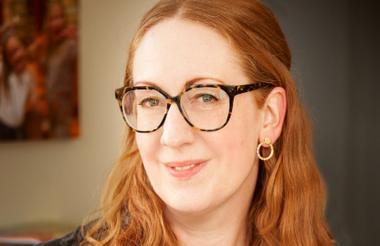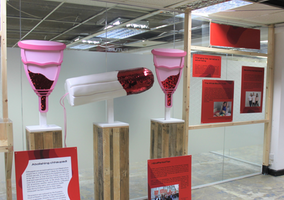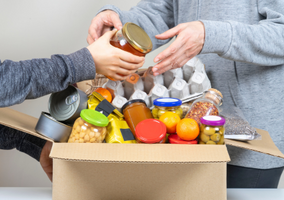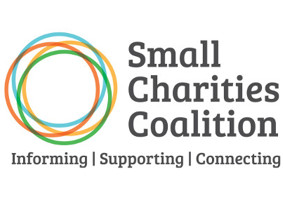Rachel Grocott was the second person to work for Bloody Good Period (BGP), and after four years “wearing many hats” at the organisation she took over as chief executive last June.
BGP began as a Facebook group in 2016 when founder Gabby Edlin realised some food banks and asylum seeker centres were not providing essential period products.
Seven years on, BGP has six employees, an income of over £450,000 and has received coverage in both the local and national media.
BGP buys period products direct from suppliers and distributes them to its charity partners, many of which are food banks and refugee centres.
It also provides a workplace accreditation programme called Bloody Good Employers, which educates businesses and their employees about menstruation and period products.
The charity has “grown quite rapidly in the last few years”, says Grocott, which is “a reflection of the need, but also the appetite for support for this issue, which is really heartening to see.”.
Grocott says public ignorance of menstruation has consequences. The charity recently responded to a Twitter post in which someone suggested period poverty was a “myth” because “there is no one in the UK who can’t afford £13 per year for sanitary products”.
“Periods are so stigmatised often it’s really difficult to get this information or to ask for it,” Grocott says.
“We encourage everybody, including those who don’t menstruate, to engage in this, and. It does a massive disservice to people who don’t have periods to think that they don’t need to know about this stuff.
“Because, at minimum, they’re going to know someone who has a period and likely they’re going to care for someone who does, whether that’s a co-worker or a friend or partner or mother. So why wouldn’t they want to understand an entirely normal human experience?”
Being okay with receiving complaints
BGP’s loud-and-proud style has meant the charity has received lots of media attention and some complaints.
“We always wanted to be bold and unapologetic, because whispering about it has got us to the situation we’re in now where so many people can’t access the products and support they need.
“It’s attention-grabbing because we need to fix this issue, not carry on whispering about it. And we do sometimes get complaints about it. But we’re okay with that because you can’t keep all people happy all the time.”
BGP received a complaint from someone “horrified” about its most recent Christmas campaign called Festive Period, because it featured a graphic with a glittery red tampon.
Grocott says: “There was one comment on Facebook that just said ‘awful’ under this picture, to which I had great fun writing a response how ‘yes, it is awful that people don’t have access to period products and it’s awful that girls start their period and don’t know what’s happening to them, and it’s awful that small charity has to fill the gap.
Those are the awful things here. Not a stylised picture of a red glittery tampon, which has clearly got your attention, which was the objective.’ It's too late to be silent about these things.”
Grocott says BGP has a real and “very large” red glittery tampon in the charity’s office that they take to its events. They call it the Glampon.
The humorous tone of some of BGP’s comms is deliberate, Grocott says.
“Humour helps to break down barriers. It helps to get people relaxed and then talking about it. It’s the same principle behind our comedy night, ‘bloody funny’, which is a favourite of mine because it’s such a joyful occasion. What can be more human than laughter?”
How does BGP raise funds?
The majority of BGP’s income comes from individual and community donations, which Grocott says the charity is “incredibly grateful for” and speaks to how its cause has captured people’s hearts.
“It's a cause that really does speak to people I think, because everybody who has a period has been in that situation of not having access to the products you need, whether that's a one-off or an ongoing situation. So, it’s very easy to think about the situation that refugees and asylum seekers, for example, find themselves in where they don't get the products that they need or an allowance for them. I think it's really captured people's attention but also hearts.
“That means that we still have a really strong base of support, despite all the pressures on people's budgets, which we're very grateful for. Lots of individual donations from the public and community fundraising, and especially in the last year with the resurgence of events.”
‘We don’t want to have to exist’
BGP’s ultimate aim is to help end the need for its services, Grocott says, but there is “no sign” of it being able to shut up shop anytime soon.
The cost-of-living crisis did not impact the charity’s income as much as expected, Grocott says, but BGP has seen a downturn in regular giving because of it.
In the current economic climate, she says it is “hard to predict” where the charity’s growth in income will come from but corporate relationships remain important for starting conversations about menstruation as well as bringing in vital funds.
.
“We hope that we will be able to continue growing corporate income with very carefully considered relationships with corporates. Bloody Good Employers have had a really strong start to 2023. We added menopause to the programme, so we now cover the whole kind of menstrual lifecycle.”
The challenges of fundraising as a smaller charity
There are many challenges to fundraising as a small charity, with there being a “perpetual question about where you invest limited resources in order to get the most return”, Grocott says.
“Especially when a cause generates such passion in people. We don’t want to be turning people away.”
“We recently invested in a CRM for the first time after operating for a long time without one. We now have a CRM, which has really transformed the way we do things and the speed of lots of other internal processes, which frees us up to do lots of other things.
“For example, we can make gift aid pay automatically every month after battles. I should think many fundraisers will resonate with having to do HMRC, spreadsheets manually.
“So, investing in that process, that’s not the only thing that CRM has helped us with, but it’s one of the main ones has really helped us free up other things so we can invest in fundraising elsewhere.”
Limited resources make it difficult to know when to speak up
Knowing when to speak up about political issues affecting your cause can also be difficult with limited resources and a small team, Grocott explains.
“There are lots of moments where we could speak up, fundraise linked to key events, and we don’t have the capacity to do them all. But we want to make sure that we are doing appropriate activity that links back to our values and our core objectives.”
With a small team working on what can be a difficult issue emotionally, it’s important to balance people's wellbeing, time and energy too, she says.
“They’re tough issues to be working on. So, they take resilience as well and we need to make sure we're looking after our people.”
She goes on to say that the charity offers flexibility to its workers to support them in their roles.
“People have other things going on in their lives, other caring responsibilities and other parts of their life, which we always think should be balanced. So, everyone has complete flexibility and is trusted to do the work in the way that works for them, and I think that creates a really positive culture.
“For me personally the thing I have to make sure I do is exercise. I am also a Zumba teacher. So, I teach three classes a week and I would definitely not be in a good position to lead anyone myself or an organisation without that other part of my life.”
Related articles












